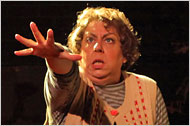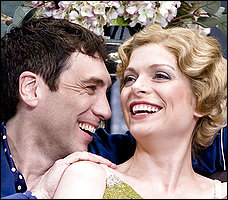“I am a galley slave to pen and ink.”
Honoré de Balzac, letter to Zulma Carraud, July 2, 1832 (trans. C. Lamb Kenney)
Archives for June 2009
TT: Who cares about the Tony Awards?
What you’ve heard is true: nothing surprising happened at last night’s Tony Awards. The word that comes to mind is unexceptionable. I think that most critics, myself included, would probably have given the best-play award to Horton Foote’s Dividing the Estate over Yasmina Reza’s God of Carnage, but beyond that I’m not feeling or hearing a lot of dissatisfaction with any of the specific awards. Yes, the Brits walked away with more than their share of prizes, but that’s not news. Broadway long ago ceased to be a center of original creative activity–it now mostly imports shows from elsewhere, including London.
The big news, if you want to call it that, is that the Tonys are now a local story rather than a national one. Scarcely anyone outside New York City watches the telecast. And the ceremony itself is mainly about musicals, which in certain seasons has been understandable, but definitely not this time around. Moreover, the Tonys themselves are about Broadway, which means that the most important new play of the season, Lynn Nottage’s Ruined, and the best straight-play revival to open in New York, David Cromer’s Our Town, both went unmentioned at last night’s ceremony.
So who cares who won and lost? The producers of reasons to be pretty do: they posted a closing notice this morning after failing to win any prizes. Conversely, The Norman Conquests is likely to see an upward spike at the box office. Otherwise, I can’t see that this year’s Tony Awards will have any effect whatsoever on the American theater, whether on Broadway or anywhere else–and that’s just fine with me.
UPDATE: I chatted about the Tony Awards with a PBS reporter by phone from Connecticut this morning. The results have just gone up on the website of The NewsHour with Jim Lehrer, which has launched a blog called Art Beat that runs Web-only art-related audio and video features.
To listen, go here.
TT: Almanac
“Imagine life without death. Every day you would want to kill yourself out of despair.”
Jules Renard, journal entry (March 1906)
CD
Emerson String Quartet, Intimate Letters (DGG). Leos Janacek’s two quartets, the first inspired by Tolstoy’s “Kreutzer Sonata” and the second by his own complex relationship with the married woman who was the muse of his old age, rank high among the masterpieces of modern classical music. Now the Emerson Quartet has recorded its vibrant, incisive interpretations of both works in an album that serves as a perfect companion piece to the group’s classic 1988 integral version of the Bartók quartets (TT).
PLAY
The History Boys (TimeLine Theater, 615 W. Wellington, Chicago, extended through Sept. 27). This Windy City production of Alan Bennett’s play about a group of English public-school prodigies and the teacher (Donald Brearley) who loves certain of them not wisely but too well is arguably superior to the original National Theatre production that played on Broadway in 2006, and has the overwhelming advantage of being performed in a very small theater (eighty-seven seats) in which the splendid performances of the ensemble cast can come through with breathtaking clarity. Worth the trip–no matter where you’re coming from (TT).
TT: Clever little Coraline
In today’s Wall Street Journal drama column I report on the most talked-about New York opening of the summer, the musical version of Coraline, and the last of the shows I saw on my recent cross-country run, Design for Living. Here’s an excerpt.
* * *
 The phrase “cult classic” sets my teeth on edge, but “Coraline,” Neil Gaiman’s deliciously scary 2002 children’s book, is well on the way to qualifying. It’s already been turned into a graphic novel and a 3-D animated feature film, and now “Coraline” has become an Off-Broadway musical whose previews generated so much buzz that the show’s limited run has already been extended for two weeks. Whether the musical version has any future beyond its current run is another matter. I think it does–but only if future productions slice away the obscuring coyness that keeps this exceptionally promising show from living up to its full potential….
The phrase “cult classic” sets my teeth on edge, but “Coraline,” Neil Gaiman’s deliciously scary 2002 children’s book, is well on the way to qualifying. It’s already been turned into a graphic novel and a 3-D animated feature film, and now “Coraline” has become an Off-Broadway musical whose previews generated so much buzz that the show’s limited run has already been extended for two weeks. Whether the musical version has any future beyond its current run is another matter. I think it does–but only if future productions slice away the obscuring coyness that keeps this exceptionally promising show from living up to its full potential….
For the stage version, Stephin Merritt, the brainy singer-songwriter whose band, the Magnetic Fields, has spawned a cult of its own, has written a self-assured score that is easily the best thing about the show. Mr. Merritt’s songs, which are terse, pointed and dramatically effective, are accompanied by an “orchestra” consisting of a pianist (Phyllis Chen) who plays a regular piano, a toy piano, and a keyboard that has been “prepared” à la John Cage. The unearthly sounds emitted by the prepared piano accompany the scenes that take place in the alternate world of Coraline’s Other Mother, an evocative and superbly theatrical touch….
The biggest problem with “Coraline” is that the title role is being played not by a girl but by a 56-year-old woman, Jayne Houdyshell, a talented actress whose performance here is inexplicably, exasperatingly twee. Not only does Ms. Houdyshell’s faux-naïf acting have nothing to do with the coolly matter-of-fact tone of Mr. Gaiman’s book, but her distracting physical presence rips up the roots of plausibility without which Coraline’s fantastic adventures in the shadow world of her Other Mother make no dramatic sense….
 Anyone who saw the Roundabout Theatre Company’s ill-conceived 2001 Broadway revival of “Design for Living” and wondered what the fuss was about should catch the next train to Washington, where all is made satisfyingly manifest by the Shakespeare Theatre Company. “Design for Living” isn’t Noël Coward’s best play, but it’s one of the most original and challenging things he ever wrote, and Michael Kahn, the company’s artistic director, has underlined the play’s essential seriousness without undermining its fizzy humor….
Anyone who saw the Roundabout Theatre Company’s ill-conceived 2001 Broadway revival of “Design for Living” and wondered what the fuss was about should catch the next train to Washington, where all is made satisfyingly manifest by the Shakespeare Theatre Company. “Design for Living” isn’t Noël Coward’s best play, but it’s one of the most original and challenging things he ever wrote, and Michael Kahn, the company’s artistic director, has underlined the play’s essential seriousness without undermining its fizzy humor….
What I like most about Mr. Kahn’s production is that his actors don’t punch the jokes too hard: They mostly just let them happen. Gretchen Egolf, who plays Gilda, the object of the slightly scrambled affections of Leo (Robert Sella) and Otto (Tom Story), is a gawky, sparkling jolie laide who dominates every scene in which she appears….
* * *
Read the whole thing here.
TT: In case you hadn’t noticed…
…there’s lots of new stuff in the right-hand column. Take a peek.
TT: Last bow
Much has already been written about Stanley Drucker’s imminent retirement as principal clarinetist of the New York Philharmonic after sixty years with the orchestra. All I can add is this: if you don’t own the live recording of Aaron Copland’s Clarinet Concerto that Drucker made with Leonard Bernstein and the Philharmonic in 1989, you’re missing one of the all-time great musical experiences.
Hail and farewell!
